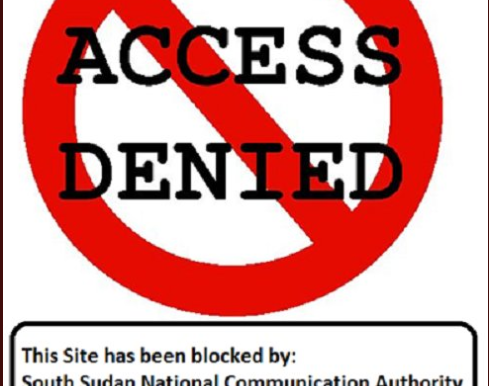South Sudan’s government has cut off access to the website of the news service Radio Tamazuj, a spokesman of the government said.
Information Minister Michael Makuei Lueth confirmed to Bloomberg that the block went into effect Monday. “If they have been disseminating hostile messages towards us then we have the authority to close them,” he was quoted as saying.
Users of some mobile phones and Wi-Fi networks in South Sudan since yesterday explained that their browsers told them that the Radio Tamazuj website “has been blocked by South Sudan National Communication Authority. “The users also had problem accessing other news websites commonly visited by South Sudanese readers.
An engineer, who preferred anonymity, told Radio Tamazuj that the decision came after a meeting held by South Sudan authorities over the past three weeks to block news websites they perceive posing a threat to the current government in Juba.
He further said the government had instructed a Chinese telecommunications equipment and systems company known as ZTE to block the website of the news service Radio Tamazuj.
But Radio Tamazuj’s broadcasts on shortwave radio are unaffected and will continue uncensored.
Several activists and political observers condemned the government of South Sudan for blocking popular and independent news websites through its internet service providers.
Alfred Taban, head of the Association for Media Development in South Sudan, condemned the decision taken by the government to block news websites in South Sudan.
He pointed out that the media body will discuss the issue. “Blocking the news websites is not good. People should have access to information, so what happened is wrong,” said Alfred.
Alfred, who is also a member of the national dialogue committee set up by President Kiir, said the issue will be discussed within the national dialogue committee.
“The issue was brought to us today. I mean the blocking of news websites would be discussed but I don’t know the date, so as members of the national dialogue committee, we said the people of South Sudan should be given their freedom to express themselves,” he said.
Meanwhile, civil society activist Edmund Yakani criticized the decision taken by the government saying the right of access to information is one of the fundamental human rights.
“If there is any incorrect information disseminated by the news websites, there should be legal processes instead of blocking them. The people in South Sudan are lacking information, so if you block the news people will rely on rumours, “he said.
He called for dialogue between the government and media houses in the country.
Abraham Mariak Albino, a renowned journalist and political analyst, said the government’s decision will not benefit the country. “When you block any media house it shows that you fear its voice,” he said.
He pointed out that the decision will definitely affect the government internationally.
The Centre for Peace and Justice (CPJ) condemned the government’s decision to block access to the website of the news service Radio Tamazuj.
“I consider the blockage of the Sudan Tribune and Radio Tamazuj by South Sudan government is breaching the laws and human rights and specifically the rights of access to information,” Tito Anthony, Executive Director of CPJ said in a statement.
Tito pointed out that the two news websites are providing reliable information across the country, stressing that their blockage will put South Sudanese in darkness.
The civil society group called on South Sudan National Communication Authority to reverse its decision.
Last week, South Sudan’s security officials arrested the director of the state television for not broadcasting President Kiir’s speech live during the 6th independence anniversary.
Last month, at least 20 foreign journalists had been denied entry by authorities. The world’s youngest nation is ranked 145th of 180 countries in Reporters Without Borders’ press freedom index.




